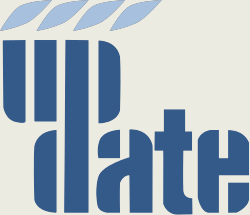Our Unique Approach
This article was originally published in the 2023 Festival brochure as "Artificial Intelligence and Transhumanism: what’s that to do with Percy French?" 1
When introducing the theme to last year’s Percy French Festival, Does the Soul have a Future?, the question we most frequently encountered was ‘What has this got to do with Percy French?’ It is the standard question raised each year when we introduce a new theme, or when a speaker gives a talk on some pressing current crises.
In fairness it is a reasonable question for someone whose knowledge of Percy French is limited. This being a result of how he has been presented over the years. French is best known for his comedy songs of yesteryear, but that is only one aspect of the man. He had much more to his artillery than comedy songs, he was multifaceted: a social observer, a political commentator, a successful writer, editor, artist, poet, lyricist, playwright, performer, family man, and we would add a Court Jester – to which we will come later.
Throughout his career he showed encyclopedic knowledge and insight into a vast range of topics and issues, which allowed him to address all sorts of situations on a broad and colourful canvas. It is on this broad canvas we bring Percy French to you. Rather than the nostalgic figure,2 we see Percy French the independent, dynamic observer of society and we aim to breathe new life into his legacy through the Festival by presenting original discussion of the touch points of our times. He was an entertainer of course, and used his gift to look at the salient issues of his time through the prism of comedy where he could parody, criticize and ridicule.
He chose topics pertinent to the time for what they were rather than an amusing distraction from them; he highlighted what was going on and connected with people’s daily difficulties and their coping of them.
In this approach, we have adopted Percy French, the active commentator, as the Festival’s mascot of cultural enquiry into the present day challenges we ourselves are faced with. This takes us to all sorts of different places while at the same time keeping Percy French alive and also to inform you of what is going on and most importantly to foster a worthwhile examination of the real issues in our society.
French and Parnell
Dr Pauric Travers,3 the former President of St Patrick’s College Drumcondra, gave an erudite talk here in 2013 on C. S. Parnell and Percy French, noting how their upbringings were similar, how their lives paralleled in many ways, and how eventually their paths crossed with both having offices close to each other in Middle Abbey Street. Dr Travers began by highlighting the contexts in which they arose, the estates in which they lived, family sizes (both were the third child; Parnell of 11; French of 9); both privately tutored; both Church of Ireland; both enjoyed similarly sized home libraries; and both attended Windermere College in the Lake District in England.
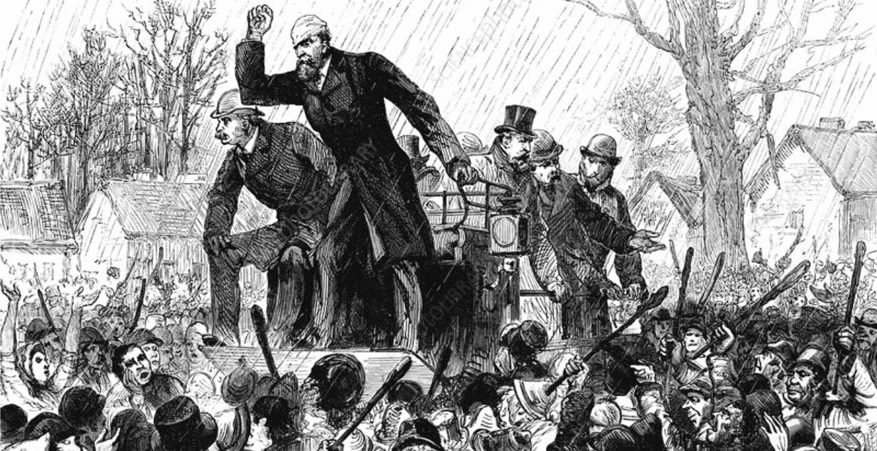
Parnell electioneering in Kilkenny
Political French
The Jarvey, was a weekly humourous magazine that relayed the political ‘goings on’ of the day, gossip from high society, soirées, balls, race meetings through caricatures, cartoons, commentaries, drawings, verses, and stories.4 It was edited by French throughout 1889 and 1890, years that coincided with the split of the Irish Parliamentary Party and Parnell’s subsequent political fall. The 104 editions, each of 16 pages, provides insight to aspects of French’s world-view and political outlook. The Jarvey of the title being a Florry Knox type fgure, a loveable rogue, reminiscent of The Irish RM of Somerville and Ross.5
The Jarvey proclaims its political neutrality loudly and repeatedly, and immediately what comes to mind is Shakespeare’s ‘Methinks he doth protest too much’. What might prove a more reliable clue to French’s disposition vis à vis politics and politicians was his description of his parents’ attempts to push him into maths and science. They had, he said, ‘visions of their little son as Astronomer Royal, telling the gaping world how many billion years must elapse before a single ray of intelligence could penetrate the skull of party politicians’.6
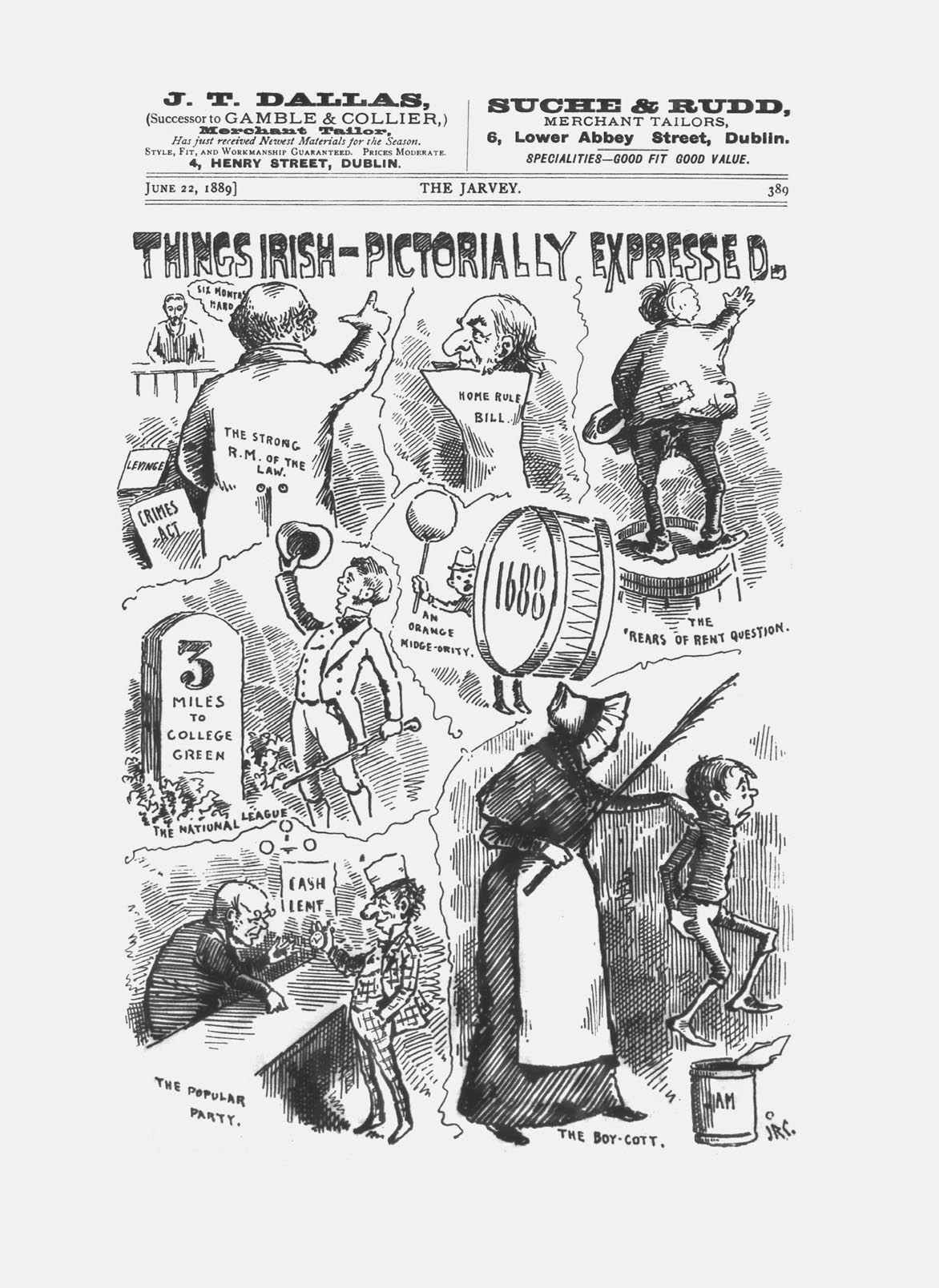
Some years earlier, between 1881–2, Percy French and John Ross had written a mock-heroic ballad entitled Could Kilmainham Jail?, about Parnell’s incarceration. Two of Parnell’s biographers, St John Ervine (1928) and Robert Kee (1993), both cited the ballad as significant, a popular street ballad which evidenced sentiment among the poor of Dublin about the Uncrowned King of Ireland.7 So here French had already shown sentiment towards Parnell. In his poem Mr Parnell at Thurles, (c.1892) French speaks through Parnell rather than one of his often used stock characters (Larry O’Flynn, Raferty, and Finnegan are examples) and complains of being abandoned by politician William O’Brien. The verses are humorous and roguish but do catch some thing of Parnell’s isolation and show empathy with his dilemma:
O Timpora! Also O Mores!
Does anyone happen to know
Am I treading with Whigs or with Tories,
And which of my friends is me foe?
Whether Liberal back me or Tory
No matter I’ll never resign;
But right to the end of the story,
In spite of O’Brien !..8
Here we see P. French departing from using one of his usual stock characters and speaking to us directly through Parnell. So, do we say Percy French was a nationalist and favoured Home Rule?
The Court Jester
Another role that Percy French assumed is that of Court Jester. In the Mountains of Mourne, in a verse not often sung, French wrote:
I seen England’s King from the top of a ’bus,
I don’t know him, but he means to know us;
And though by the Saxon, we once were oppressed,
Still I cheered–God forgive me –I cheered with the rest.
and now that he’s visited Erin’s green shore,
We’ll be much better friends than we’ve heretofore,
When we’ve got all we want we’re as quiet as can be
Where the Mountains o’ Mourne sweep down to the sea.
Again, it is humorous and again he redeploys his comic genius to the task and it is masterful in its imagining. French sets the scene, we are in the Royal court laughing and cheering, French being the royal Jester is cheering with us, but then ingeniously out of a situation of whimsy, the court Jester first drops his head in repentance, asks for forgiveness... and then out of nowhere comes ‘when we’ve got all we want we are as quiet as can be’.
Words politically charged no matter what way you look at them. And surely it is a pitiful state for us to be in as a nation and French includes himself in this? We can be bought in other words? We have to look at the subtly of French at work here. French first asserts himself alongside us, his audience, he is laughing and cheering with us, but equally he is asking us to watch out, not to get caught up in all the pageantry/splendour and pomposity of the royal entourage. Do not sell yourselves short. And remember too, the context of this verse; in the previous verse he asks Mary ‘not to be startin them fashions now, Mary mo chroi, where the mountains of Mourne sweep down to the sea’. Percy French is placing the emphasis here on natural beauty and simple living, which serves the purpose of demarcating the Irish way of life from that of industrialised Britain. He wanted Ireland to be Ireland, for Ireland to hold on to its Irishness. In other words you can ‘tug the forelock’ but be careful, is what he is cautioning his audience. French knew that his family’s social standing, as landlords, was entwined with acquiescence within the British class system. By the turn of the century in Ireland he saw how with political developments social perceptions were changing too, and he noted he was now part of ‘not the landed gentry but the stranded gentry’. Though rueful of his past acquiescences nonetheless he is a happy witness to the erosion of class status.
And if we think about it, what is Percy French doing but putting words on his beautiful Irish landscape paintings (which he did abundantly), where he depicts the simple natural beauty of the land – the stream, the bog, a clump of heather, or perhaps a cluster of trees in a bereft landscape. This is our magnificent countryside, this is us, this is who we are, we are a product of this countryside, hold onto your relationship with it; be careful, in other words, because he too fell into all of this stuff that leads nowhere but repentance, ‘forgive me I too cheered with the rest’. Bear in mind the timing of this lyric (1902), Parnell was dead and Home Rule was the dominant language on the political landscape. It was in the evolutionary period which preceded the revolutionary period and French, though mournful was extremely mindful and as always had his fnger on the pulse.
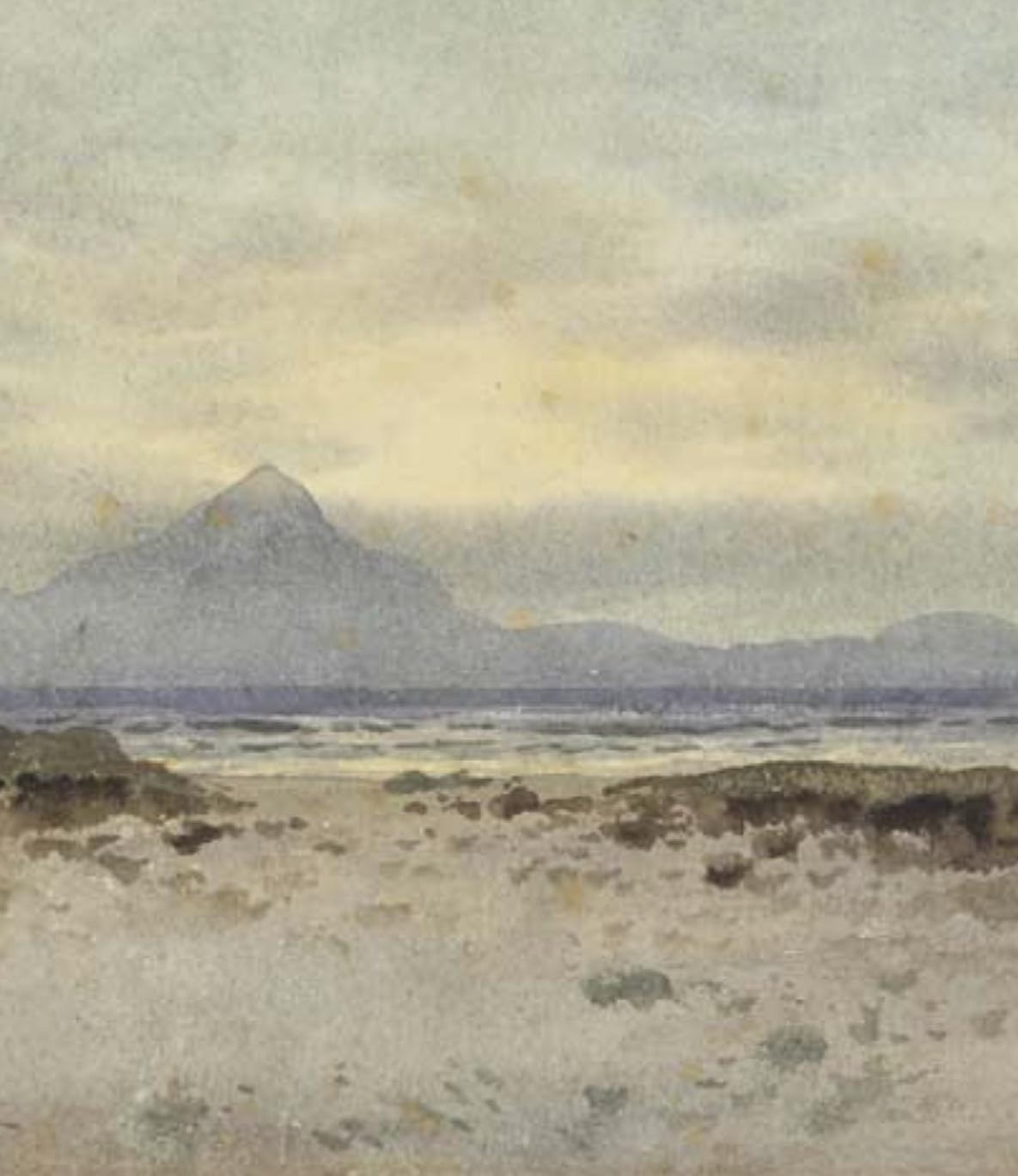
Percy French, Where The Mountains of Mourne sweep down to the Sea (detail), watercolour, 9½ x 14 ins
French was a great artist, at every level of the role he assumed, painter, poet, editor, Jester. And here in the king’s court he is, in Shakespeare’s words, ‘wise enough to play the fool’. Here he plays the role of the poet/jester as the conscience of the nation. The poet like the jester lives among his people, he is not elevated, he hides his wisdom carefully so pay attention. French knew the boundaries and greatly depended on his court (audience); and as an entertainer he could not risk ofending his audience by taking sides, so he regularly claimed that he was above politics.
And if we look at the The Queen’s Advice to Lord Zetland before Starting for Ireland [as the new Lord Lieutenant] – as Overheard and Reported by Larry O’Flynn [1900] or in The Queen’s After-Dinner Speech (as overheard and cut into lengths of poetry by James Murphy, deputy-assistant waiter at the Vice Regal Lodge) [1899],9 we see the Royal Jester in a private audience with the Queen Victoria, and no-one escapes a swipe. As Dr. Travers says, ‘It includes practically every one of note in Irish society at the time – Maud Gonne, William B. Yeats (‘who should be at home sez she,/french polishing a poem, sez she’), and Anna Parnell (Charles Stuart’s younger sister )10
’But in these parts’, sez she,
’They have warrum hearts’, sez she,
’And like me well’, sez she,
’Barrin Anna Parnell’, sez she,
’And that other one’, sez she,
’That Maud Gonne’, sez she,
’Dhressin in black’, sez she,
’To welcome me back, sez she,
’And all that gammon sez she,
’about me bringing the famine sez she,
’Now Maud Gonne will write sez she,
’that I will bring the blight sez she,
’or altered the saysons sez she,
’ some private raysins, sez she,...
Here Percy French, as Court Jester, tells the Queen all about the fools in Ireland ‘Paradin their crimes in The Irish Times’. One can imagine how much fun French had in writing these verses.
In 1890, he published The First Lord Lieutenant, a satirical drama on Queen Elizabeth I and the Earl of Essex. Yet again we are in the Royal Court and again we are in private audience with Queen Elizabeth I, at breakfast in the back parlour of Buckingham Palace! He begins by taking a swipe at the press, ‘I have been reading the Dublin Evening Mail and The Telegraft, for some time back, and sorra one o’me can get at the root o’how things is going, for the leading articles is as contradictory as if the wor husband and wife’. The play is laced with anachronism (Buckingham Palace was built a century later) and cynical contemporary resonances. Again the court jester is having a field day in his regal setting.
And remember, the role of the Jester, the Jester was a serious commentator, and in the royal court he had special privileges; he was allowed to talk out of turn, sing, mock, parody, and revile freely without being punished. The Jester was a fool who was allowed to tell the truth and the truth can come out in all forms and all sorts of ways and people can laugh, but it is deadly serious. And the irony of it is, someone with a greater role or higher ranking in the King’s court, could find himself hung for saying less. Indeed, in its original form the court jesting was the only channel through which tyranny could be confronted, through which wrongs could be addressed, and here at the Festival we would argue French did it for democracy through his wide variety of writings and especially in The Jarvey week by week.
The Jester is the person to counter sycophancy, to counter cultural acquiescences, nominal privileges, and it is a very interesting time in Irish history to be writing and singing all this stuff. French also wrote comic operas and what is the comic opera but only a musical form of the Jester.
‘It would be wrong then to conclude that Percy French was disinterested in politics or the political challenges of the day, in fact he displayed a consistent interest in the larger questions of Irish history, Irish society, and the political life of the time – it was just that his take and approach were rather different and such was French’s comic genius that they were misunderstood and misinterpreted as condescending and roguish’.11
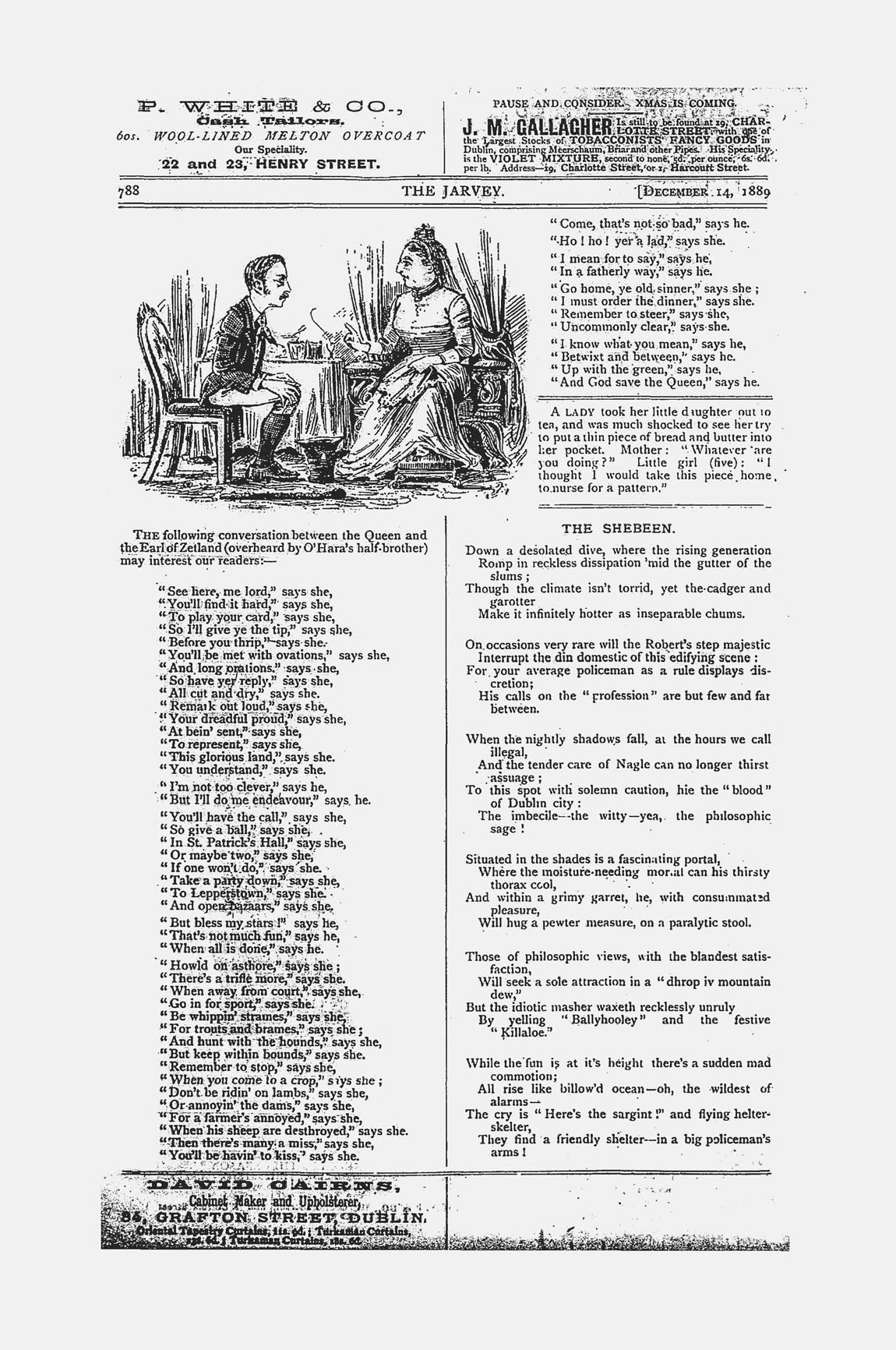
The Jarvey failed, according to Dr Travers,
‘Partly because it did not have a receptive audience among the Catholic middle class who were increasingly dominating Irish life at the time; Percy French’s reception continued to be dogged by a perception that he was a partisan and condescending to the Irish, especially the struggling every day Irish man and woman. Which is regrettable as he had a real affection for characters like the Jarvey, Murphy, Slattery, and others; and although French spoke through a myriad of such characters and had an aversion to being serious, we can, as pointed out on a close reading divine his feelings, his outlook, and political leanings.
In conclusion, Dr Travers argues that:
‘It would be wrong to dismiss Percy French’s work as unimportant or trivial as it has been for the last 100 years, and it would be wrong to dismiss the characters inhabiting his songs and stories as paddywhackery or stereotypical. Percy French was a man of his time, was well aware of what was going on and the politics that were being played out at the time and he very carefully chose ways to highlight this’.
This is the Percy French we want to re-present to you, a living, thriving Percy French in the present, and in view of the fact that his own residence in Roscommon was demolished, we have given him a new home.
Here at Castlecoote House, Percy French can dwell in his native and beloved County Roscommon, in a somewhat similar period home as the one he grew up in. Castlecoote House itself reflects the architectural culture of French’s time and embodies an authentic reflection of the period he grew up, as well as having the library, big rooms and the facilities he had. Not to mention the landscape setting which he would likely adore. Equally importantly too it gives him a sense of place, and place is one of the great metaphors for minds and French’s mind was expansive to an extraordinary degree.
What we want to do above all is to create a context, where even if Percy French’s name were not on this festival, he would be the first one to jump over the gate or swim across the River Suck to hear what is being said, to hear what is going on.
Being alive to Percy French today
Nowadays an avalanche of topics engulfs us all, through a range of media impossible in French’s time. Inevitably it sweeps us into contact with all sorts of concepts whether we are individually comfortable with them or not.
So, the Festival is not a history club; its interest is not pastiche. While respecting French’s lifetime achievements in music, plays, poems, and paintings, our principal aim is to highlight what is actually going on and then bring the impetus of Percy French to the social and political questions of the day. Were Percy French alive now, he would no doubt be observing the extraordinary developments of our times and commenting on them, as indeed the Festival seeks to do. We can therefore readily imagine French addressing the future in which artificial intelligence and transhumanism will directly affect us all.
Kevin Finnerty
July 2023
NOTES
1. This was the theme of the Percy French Festival 2022, and the title of a paper I gave there.↩
2. Nostalgia has a limited journey. The reason for the Festival’s longevity stems from bringing Percy French’s social awareness into the 21st century.↩
3. Dr Travers gave his talk, Parnell and French, at the Festival in 2013. He was one of the earliest to point out Percy French’s political stance. Previously, Percy French was commonly referred to as being apolitical. Dr Travers showed that far from being apolitical French was at the forefront of many of political crises and a staunch supporter of C. S. Parnell. Both President Michael D. Higgins and Dr Caitriona Cleere referred to French as the most important social commentator of his time.↩
4. Both political and social sides of PF are evident in The Jarvey. Notwithstanding the North Down Percy French Society’s Trojan work in providing printed volumes of the magazine in entirety to several museums, the Percy French Festival is currently digitising all issues of The Jarvey and plans to provide them for the first time to the public in 2024.↩
5. ibid.↩
6. Emily de Burg Daly, Chronicles and Poems of Percy French, Talbot Press, Dublin, 1922.↩
7. Dr Travers, ibid. Robert Kee, The Laurel and The Ivy: The Story of Charles Stewart Parnell and Irish Nationalism, Hamish Hamilton, 1993. St John Ervin, Parnell, E. Benn, London, 1928.↩
8. The full poem can be found in Brenan O’Dowda’s biography, The World of Percy French, Blackstaf Press, Belfast, 1981.↩
9. The Queen’s Advice... was written when Lord Zetland was sent by Queen Victoria to be Lord Lieutenant of Ireland in 1889 and published in The Jarvey, p788, December 1899. Thanks to Berrie O’Neill of the North Down Percy French Society for help with this entry.↩
10. Travers, ibid.↩
11. ibid↩
